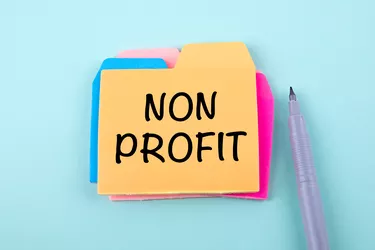
Even Uncle Sam and the long arm of the IRS encourage being kind to and extending a helping hand to others, and most state tax codes follow suit. Most legislatures exempt qualifying, nonprofit organizations from paying a variety of taxes. The New Jersey Division of Taxation is one of them.
The catch lies in the word "qualifying." Numerous rules apply to what an organization can, can't and must do in order to receive this preferential tax exempt status. But a good many meet these rules. The Tax Policy Center indicates that 1.74 million exempt organizations were registered with the IRS as of 2020. And yes, registering is one of those rules.
Video of the Day
Video of the Day
What Exactly Is a Nonprofit?
Most qualifying nonprofit organizations fall under the umbrella of Section 501(c)(3) of the Internal Revenue Code. They've received official, written notification from the IRS stating that they're relieved of the burden of paying a federal income tax.
Qualifying charitable organizations must provide a service to the public without receiving any profit from doing so. They can include educational organizations as well as churches and ministries, according to the Social Security Administration. Museums, humane societies, health and human services organizations, some credit and labor unions and fraternal organizations can qualify as well.
Rules for Qualifying Nonprofit Status
Qualifying as a nonprofit organization under Section 501(c)(3) requires applying for and being approved for this status by the IRS and/or with the state where the organization operates and is located if the goal is to be exempted from state and local taxes as well.
Approval from the IRS depends on the organization's articles of incorporation containing specific provisions, and they have a limited time to apply: 27 months, not including the initial month in which they were created. A user fee must accompany the application. They must then report annually thereafter to maintain their status.
A tax-exempt organization is restricted from participating in certain activities. For example, they can only engage political campaign activities if these activities are not their primary purpose.
Do Nonprofits Pay Taxes?
Qualifying nonprofits are exempt from paying federal income tax, although they may still have to pay excise taxes, income tax on unrelated business activities and employment taxes. About 35 percent of these organizations have to file annual tax returns establishing that they're exempt, according to the Tax Policy Center. It depends on the amount of their gross receipts.
Most states exempt nonprofits from paying certain sales taxes, property taxes or unrelated business income tax.
Numerous rules apply to what an organization can, can't and must do in order to receive this preferential tax exempt status.
About Those Employment Taxes
The IRS defines employment taxes as the income tax that's withheld from employees' paychecks, as well as the Social Security and Medicare (FICA) taxes to which both employee and employer must contribute.
Qualifying nonprofits are not exempt from withhold and depositing these funds with the federal government. They must pay half those Social Security and Medicare taxes for all employees who earn more than $100 over the course of the calendar year, according to the IRS. They must also pay the federal unemployment tax for anyone who earns $50 or more in a calendar quarter if any employee received pay of $1,500 or more in any quarter during the current or prior tax year, or if it had at least one employee at any time during the last 20 calendar weeks.
Your Personal Tax Return
You must pay Social Security tax on your earnings of $108.28 or more if you're an employee of a nonprofit organization. You and your nonprofit employer share this and the Medicare tax 50/50 at an overall rate of 15.3 percent: 12.4 percent for Social Security and 2.9 percent for Medicare.
But some nonprofits are exempt from contributing half of your Social Security and Medicare taxes or even withholding your share from your pay and depositing it with the federal government on your behalf.
Here's a bit of bad news if you happen to work for one of them: The IRS treats you as being self-employed in this case, according to the SSA. You have to pay the entire 15.3 percent on your own, and you must do so quarterly. You'll pay penalties and incur interest if you wait until the end of the tax year when you file your return.
- New Jersey Division of Taxation: Nonprofit Organizations and Government Entities
- IRS: Federal Tax Obligations of Non-Profit Corporations
- IRS: Compliance Guide for Tax-Exempt Organizations
- Social Security Administration: If You Work for a Nonprofit Organization
- Tax Policy Center: What Entities Are Tax-Exempt?
- IRS: Employment Taxes